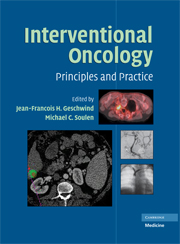Book contents
- Frontmatter
- Contents
- FOREWORD
- ACKNOWLEDGMENTS
- CONTRIBUTORS
- PART I PRINCIPLES OF ONCOLOGY
- PART II PRINCIPLES OF IMAGE-GUIDED THERAPIES
- PART III ORGAN-SPECIFIC CANCERS
- 9 Hepatocellular Carcinoma: Epidemiology, Pathology, Diagnosis and Screening
- 10 Staging Systems for Hepatocellular Carcinoma
- 11 Hepatocellular Carcinoma: Medical Management
- 12 Surgical Management (Resection)
- 13 Liver Transplantation for Hepatocellular Carcinoma
- 14 Image-guided Ablation of Hepatocellular Carcinoma
- 15 Embolization of Liver Tumors: Anatomy
- 16 Transcatheter Arterial Chemoembolization: Technique and Future Potential
- 17 New Concepts in Targeting and Imaging Liver Cancer
- 18 Intrahepatic Cholangiocarcinoma
- 19 Medical Management of Colorectal Liver Metastasis
- 20 Surgical Resection of Hepatic Metastases
- 21 Clinical Management of Patients with Colorectal Liver Metastasis Using Hepatic Arterial Infusion
- 22 Colorectal Metastases: Ablation
- 23 Colorectal Metastases: Chemoembolization
- 24 Radioembolization with 90Yttrium Microspheres for Colorectal Liver Metastases
- 25 Carcinoid and Related Neuroendocrine Tumors
- 26 Interventional Radiology for the Treatment of Liver Metastases from Neuroendocrine Tumors
- 27 Immunoembolization for Melanoma
- 28 Preoperative Portal Vein Embolization
- 29 Cancer of the Extrahepatic Bile Ducts and the Gallbladder: Surgical Management
- 30 Extrahepatic Biliary Cancer: High Dose Rate Brachytherapy and Photodynamic Therapy
- 31 Extrahepatic Biliary Cancer/Biliary Drainage
- 32 Surgical and Medical Treatment
- 33 Percutaneous Renal Ablation
- 34 Embolotherapy in the Management of Renal Cell Carcinoma
- 35 Epidemiology, Diagnosis, Staging and the Medical-Surgical Management of Lung Cancers
- 36 Image-guided Ablation in the Thorax
- 37 Interventional Treatment Methods for Unresectable Lung Tumors
- 38 Interventional Neuroradiology in Head and Neck Oncology
- 39 Percutaneous Ablation of Painful Metastases Involving Bone
- 40 Intra-arterial Therapy for Sarcomas
- 41 Prostate Cryoablation: A Role for the Radiologist in Treating Prostate Cancer?
- PART IV SPECIALIZED INTERVENTIONAL TECHNIQUES IN CANCER CARE
- INDEX
- Plate section
- References
19 - Medical Management of Colorectal Liver Metastasis
from PART III - ORGAN-SPECIFIC CANCERS
Published online by Cambridge University Press: 18 May 2010
- Frontmatter
- Contents
- FOREWORD
- ACKNOWLEDGMENTS
- CONTRIBUTORS
- PART I PRINCIPLES OF ONCOLOGY
- PART II PRINCIPLES OF IMAGE-GUIDED THERAPIES
- PART III ORGAN-SPECIFIC CANCERS
- 9 Hepatocellular Carcinoma: Epidemiology, Pathology, Diagnosis and Screening
- 10 Staging Systems for Hepatocellular Carcinoma
- 11 Hepatocellular Carcinoma: Medical Management
- 12 Surgical Management (Resection)
- 13 Liver Transplantation for Hepatocellular Carcinoma
- 14 Image-guided Ablation of Hepatocellular Carcinoma
- 15 Embolization of Liver Tumors: Anatomy
- 16 Transcatheter Arterial Chemoembolization: Technique and Future Potential
- 17 New Concepts in Targeting and Imaging Liver Cancer
- 18 Intrahepatic Cholangiocarcinoma
- 19 Medical Management of Colorectal Liver Metastasis
- 20 Surgical Resection of Hepatic Metastases
- 21 Clinical Management of Patients with Colorectal Liver Metastasis Using Hepatic Arterial Infusion
- 22 Colorectal Metastases: Ablation
- 23 Colorectal Metastases: Chemoembolization
- 24 Radioembolization with 90Yttrium Microspheres for Colorectal Liver Metastases
- 25 Carcinoid and Related Neuroendocrine Tumors
- 26 Interventional Radiology for the Treatment of Liver Metastases from Neuroendocrine Tumors
- 27 Immunoembolization for Melanoma
- 28 Preoperative Portal Vein Embolization
- 29 Cancer of the Extrahepatic Bile Ducts and the Gallbladder: Surgical Management
- 30 Extrahepatic Biliary Cancer: High Dose Rate Brachytherapy and Photodynamic Therapy
- 31 Extrahepatic Biliary Cancer/Biliary Drainage
- 32 Surgical and Medical Treatment
- 33 Percutaneous Renal Ablation
- 34 Embolotherapy in the Management of Renal Cell Carcinoma
- 35 Epidemiology, Diagnosis, Staging and the Medical-Surgical Management of Lung Cancers
- 36 Image-guided Ablation in the Thorax
- 37 Interventional Treatment Methods for Unresectable Lung Tumors
- 38 Interventional Neuroradiology in Head and Neck Oncology
- 39 Percutaneous Ablation of Painful Metastases Involving Bone
- 40 Intra-arterial Therapy for Sarcomas
- 41 Prostate Cryoablation: A Role for the Radiologist in Treating Prostate Cancer?
- PART IV SPECIALIZED INTERVENTIONAL TECHNIQUES IN CANCER CARE
- INDEX
- Plate section
- References
Summary
Colorectal cancer is the third most common cancer in the United States, and about 145,000 new cases are expected each year (1). Approximately 15% to 30% of all colorectal cancer patients have synchronous liver metastases at initial diagnosis, and up to 60% will develop hepatic metastases at some point during their disease course (2–4). Therefore, liver metastases from colorectal cancer are a common oncologic problem. Because management of patients with colorectal liver metastases frequently involves medical oncologists, surgical oncologists, interventional radiologists and other specialists, a multidisciplinary setting is optimal.
Palliative chemotherapy remains the mainstay of treatment for patients with widely metastatic colorectal cancer, and survival has increased significantly with the introduction of novel agents. However, 5-year survival of such patients remains anecdotal. Advances in surgical and interventional techniques, however, have made cure a possibility for some colorectal cancer patients with liver-only metastases. Patients with initially resectable colorectal liver metastases have achieved impressive 5-year survival rates of 30% to 70% following metastatectomy (4–6). Unfortunately, only 20% to 30% of patients with colorectal liver metastases are candidates for resection at initial presentation (7, 8).
Preoperative or neoadjuvant chemotherapy may improve the rate of successful metastatectomy, limit the extent of hepatectomy and improve postoperative recovery in this group of patients. In patients with unresectable liver metastases, neoadjuvant chemotherapy can potentially render previously unresectable liver metastases amenable to surgery. The 5-year survival rate of those who subsequently undergo hepatic metastatectomy has been reported to be 20% to 40% (9).
- Type
- Chapter
- Information
- Interventional OncologyPrinciples and Practice, pp. 222 - 242Publisher: Cambridge University PressPrint publication year: 2008
References
- 1
- Cited by



